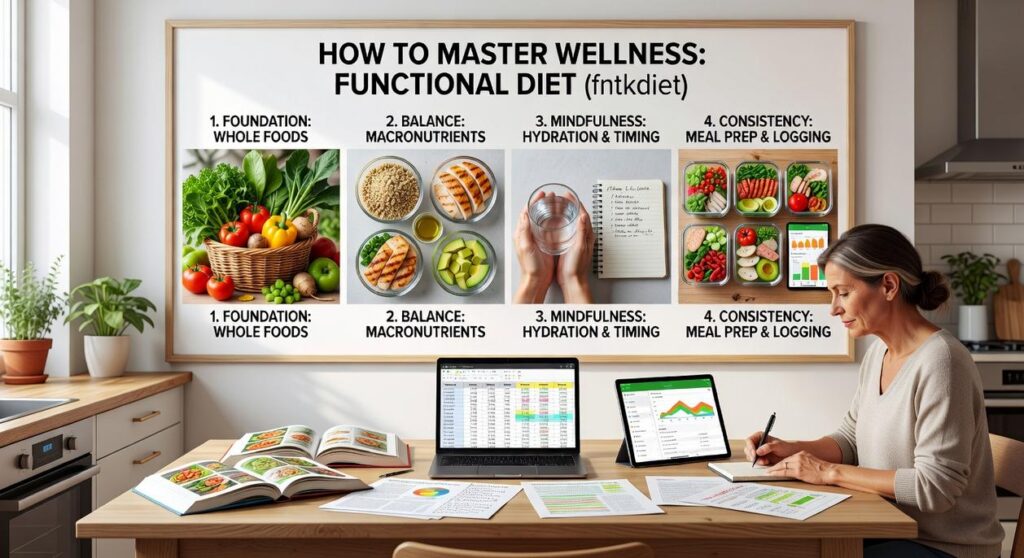I’ve spent years cutting through the noise in health advice, and I can tell you this: most of it overcomplicated things.
You’re probably tired of diets that promise everything but leave you feeling restricted and burned out. I’ve seen it happen too many times.
Here’s the truth: sustainable health isn’t about following the latest trend or cutting out entire food groups. It’s about understanding how diet and lifestyle work together.
This guide gives you a practical framework for building real wellness. Not the kind that lasts three weeks. The kind that sticks.
The strategies I’m sharing come from established nutritional science. We’ve tested these approaches with real people who wanted lasting results, not quick fixes that fade.
You’ll learn how to master wellness fntkdiet through a step-by-step approach that actually fits into your life.
No restrictive rules. No burnout. Just a clear path to feeling better in your body.
This is your blueprint for health that lasts.
Beyond the Scale: Redefining ‘Optimized Health’
Your scale doesn’t tell the whole story.
I know that sounds like something you’d see on a motivational poster. But stick with me because this matters more than you think.
Most people step on the scale every morning and let that number dictate their entire day. Down two pounds? Great day ahead. Up a pound? Time to spiral.
Here’s what that number doesn’t show you.
It doesn’t measure your energy at 3pm when you used to crash. It doesn’t track the mental fog that finally lifted. It can’t tell you that your mood is more stable or that your blood markers just moved out of the prediabetic range.
Real health lives in these places. Not on a digital readout between your toes.
When you learn how to master wellness fntkdiet, you start paying attention to what actually matters. How you feel when you wake up. Whether you can think clearly through afternoon meetings. If you’re preventing disease instead of just reacting to symptoms.
But here’s where it gets interesting.
The diet that works for your coworker might make you feel terrible. We call this bio-individuality, and it’s why cookie-cutter meal plans fail most people.
Your body has its own preferences. Maybe you do great with carbs at breakfast. Maybe you need more protein than the standard recommendations. The only way to know is to actually listen.
Now, you might be wondering what this looks like in practice.
That’s where balance comes in. Not the Instagram version where everything is perfectly portioned and color-coordinated. Real balance. The kind where you eat well most of the time and don’t lose your mind over birthday cake.
I follow the 80/20 rule. Eighty percent of the time, I make choices that support my health goals. The other twenty percent? I live my life.
This isn’t about perfection. It’s about building habits you can actually maintain. Check out fntkdiet fitness advice from fitness talk for practical ways to make this work in your daily routine.
The Pillars of a Balanced Diet: What to Put on Your Plate
Let me clear something up right away.
A balanced diet isn’t about perfection. It’s about understanding what your body actually needs and then making choices that work for your life.
I see people get confused about macronutrients all the time. So let’s break it down.
Proteins rebuild your muscles and keep you full. Think chicken, fish, eggs, beans, and Greek yogurt. Your body uses these to repair tissue after workouts (or just a long day).
Fats aren’t the enemy. Your brain needs them. Your hormones need them. Avocados, nuts, olive oil, and fatty fish like salmon give you the good stuff that keeps your energy steady.
Carbohydrates fuel everything you do. Yes, even thinking. Whole grains, sweet potatoes, oats, and fruit give you sustained energy without the crash you get from processed junk.
Now here’s what confuses people about micronutrients.
You can’t just pop a multivitamin and call it done. Your body absorbs vitamins and minerals better from real food. That’s why I focus on eating different colors throughout the day. Red peppers, dark leafy greens, blueberries, orange carrots. Each color brings different nutrients to the table.
Water is where most people mess up without realizing it.
You need it for every single process in your body. Your metabolism slows down when you’re dehydrated. Your brain gets foggy. You feel tired for no reason.
I keep a water bottle with me everywhere. First thing in the morning, I drink a full glass before coffee. That simple habit changed how I feel by noon.
Here’s a pro tip: if you’re hungry an hour after eating, you might just be thirsty.
Fiber is the piece nobody talks about enough.
It keeps your digestive system moving. It helps control your blood sugar so you don’t get those energy crashes. And it keeps you full longer than almost anything else.
Beans, lentils, whole grains, vegetables, and fruits with the skin on. These are your fiber sources. Aim for 25 to 30 grams daily according to research from the American Journal of Clinical Nutrition.
When you learn how to master wellness fntkdiet principles, you start seeing food differently. Not as good or bad. Just as fuel that either serves you or doesn’t.
Your plate should have protein, healthy fats, complex carbs, and fiber at most meals. That’s it. That’s the foundation.
Actionable Nutrition: Smart Meal Planning and Mindful Eating

You know that Sunday night panic when you realize you have no idea what you’re eating this week?
Yeah, I’ve been there too.
You end up grabbing whatever’s convenient. Fast food on Tuesday. Frozen pizza on Thursday. By Friday you’re wondering why your energy is shot and your jeans feel tight.
The truth is, most of us don’t plan our meals because we think it’s complicated. We picture elaborate spreadsheets and hours of prep work.
But here’s what actually works.
The Basics of Meal Planning
Start simple. Pick three dinners for the week. That’s it.
Write them down. Buy what you need. Cook extra so you have leftovers for lunch.
I batch cook on Sunday evenings (nothing fancy, just rice, roasted vegetables, and grilled chicken). It takes about an hour and covers half my week.
Keep healthy snacks visible. I’m talking nuts, cut vegetables, fruit, Greek yogurt. When they’re right there in your fridge, you’ll actually eat them.
How to Build a Balanced Plate
Here’s the simple rule I follow. Half my plate is vegetables. A quarter is protein like chicken, fish, or beans. The last quarter is complex carbs like quinoa, sweet potato, or brown rice.
That’s it. No measuring, no counting, no stress.
Your body gets what it needs without you overthinking every meal. This approach is backed by research from the Harvard School of Public Health, and it works because it’s visual and easy to remember.
The Practice of Mindful Eating
Now let me ask you something. When was the last time you actually tasted your food?
Most of us eat while scrolling our phones or watching TV. We finish our plate and barely remember eating.
Mindful eating just means paying attention. Eat slowly. Notice when you’re actually full (not stuffed, just satisfied). Put your fork down between bites.
Studies show this simple practice improves digestion and helps prevent overeating. Your brain needs about 20 minutes to register fullness. When you eat fast, you miss those signals entirely.
This is how to master wellness fntkdiet without turning your life upside down. Small changes that stick beat perfect plans you’ll abandon in two weeks.
The Lifestyle Synergy: How Sleep, Stress, and Movement Amplify Results
Ever notice how everything falls apart when you’re running on five hours of sleep?
You crave sugar. You skip workouts. You snap at people for no reason.
That’s not a coincidence.
Your body doesn’t work in silos. Sleep affects stress. Stress affects movement. Movement affects sleep. And all of it impacts whether you lose weight or gain it back.
Some people say lifestyle factors are just “nice to have” additions to a good diet. They think if you just eat right, the rest will fall into place.
But here’s what the research actually shows.
You can follow the perfect meal plan and still struggle if you’re only sleeping four hours a night. A 2004 study found that sleep deprivation messes with two hormones that control hunger: ghrelin and leptin (Taheri et al., PLOS Medicine). When you don’t sleep enough, ghrelin goes up and tells you to eat everything. Leptin goes down and stops signaling that you’re full.
So you end up standing in front of the fridge at 10 PM wondering why you’re so hungry.
Sound familiar?
The same thing happens with stress. Chronic stress floods your system with cortisol, which loves to store fat around your midsection. That’s not just vanity weight. Abdominal fat is linked to higher risks of heart disease and diabetes.
Here’s the thing though. You don’t need to become a meditation guru or sleep scientist to see results.
Start with 7 to 9 hours of sleep. I know that sounds impossible if you’re juggling work and family. But even adding 30 minutes makes a difference.
For stress, try something simple. Deep breathing for two minutes. A 10-minute walk outside. Journaling before bed. Pick one thing that doesn’t feel like another chore on your list.
And movement? Forget what you think fitness has to be.
You don’t need to suffer through workouts you hate. I’ve seen people transform their health by dancing in their living room or hiking on weekends. The best exercise is the one you’ll actually do.
That’s how to master wellness fntkdiet. You find what works for your life and you stick with it.
Try mixing it up. Some cardio for your heart. Some strength work to keep your metabolism humming. A bit of stretching so you can still move well at 70.
But honestly? Just move in ways that bring you joy.
Because here’s what nobody tells you about does liposuction work fntkdiet. Even surgical interventions work better when you support them with solid lifestyle habits.
Your body is a system. When you take care of sleep, stress, and movement together, everything else gets easier.
Your Journey to Lasting Vitality Starts Now
You’re tired of diets that promise everything and deliver nothing.
I get it. The endless cycle of restriction and disappointment wears you down. You want results that actually stick.
This guide gives you a different path. One built on balance instead of deprivation.
You now have a clear plan to optimize your health through real food and sustainable habits. No gimmicks or impossible rules to follow.
Here’s why this works: Your body responds to consistency and care, not punishment. When you focus on overall well-being instead of just the number on the scale, everything shifts.
The confusion stops here.
Start today with one simple step. Plan your meals for the next three days or add a 20-minute walk to your routine. That’s it.
Small actions compound over time. Research shows that people who make gradual lifestyle changes maintain their results far longer than those who jump into extreme diets (and we’ve seen this play out hundreds of times).
You came here looking for a way to master wellness fntkdiet that actually fits your life.
Now you have it. Take that first step today. Homepage.

